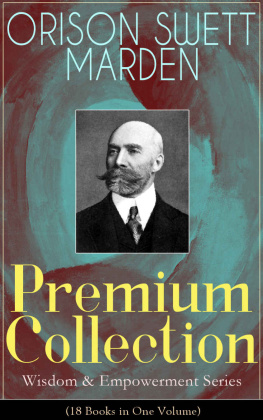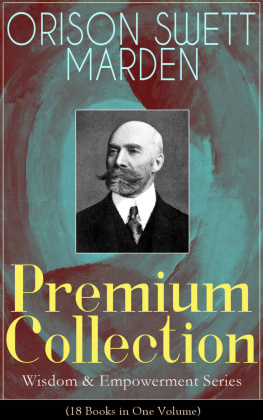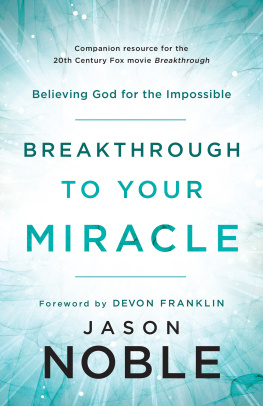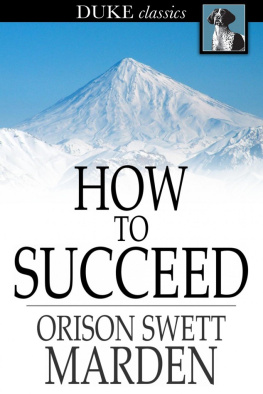Orison Swett Marden - The Miracle of Right Thought
Here you can read online Orison Swett Marden - The Miracle of Right Thought full text of the book (entire story) in english for free. Download pdf and epub, get meaning, cover and reviews about this ebook. year: 2016, publisher: FV Éditions, genre: Religion. Description of the work, (preface) as well as reviews are available. Best literature library LitArk.com created for fans of good reading and offers a wide selection of genres:
Romance novel
Science fiction
Adventure
Detective
Science
History
Home and family
Prose
Art
Politics
Computer
Non-fiction
Religion
Business
Children
Humor
Choose a favorite category and find really read worthwhile books. Enjoy immersion in the world of imagination, feel the emotions of the characters or learn something new for yourself, make an fascinating discovery.
- Book:The Miracle of Right Thought
- Author:
- Publisher:FV Éditions
- Genre:
- Year:2016
- Rating:3 / 5
- Favourites:Add to favourites
- Your mark:
- 60
- 1
- 2
- 3
- 4
- 5
The Miracle of Right Thought: summary, description and annotation
We offer to read an annotation, description, summary or preface (depends on what the author of the book "The Miracle of Right Thought" wrote himself). If you haven't found the necessary information about the book — write in the comments, we will try to find it.
Orison Swett Marden: author's other books
Who wrote The Miracle of Right Thought? Find out the surname, the name of the author of the book and a list of all author's works by series.
The Miracle of Right Thought — read online for free the complete book (whole text) full work
Below is the text of the book, divided by pages. System saving the place of the last page read, allows you to conveniently read the book "The Miracle of Right Thought" online for free, without having to search again every time where you left off. Put a bookmark, and you can go to the page where you finished reading at any time.
Font size:
Interval:
Bookmark:
Copyright 2016 / FV ditions
Cover Element: Pixabay.com
ISBN 979-10-299-0202-4
All Rights Reserved
Change the Man
Every art is but the result of some trained faculty of man.
The majority of people who make a failure in life do so because they never learn to guard and strengthen their weak points.
To correct deficiencies, remedy defective faculties, overcome peculiarities, and bring the mind into symmetry and poise so that it will express its maximum of power, will form a large part of the education of the future.
Years ago, Central Park and other parts of upper New York City were made very unsightly by squatters, people who camped on vacant lands and built all kinds of unbeautiful shanties on them. They made a great deal of trouble for the real owners of the land, especially those who resided abroad, because, after a protracted occupation, they would often dispute the ownership.
Many people are troubled with mental squatters, such as prejudice, bigotry, superstition, cowardice, jealousy, and all kinds of little peculiarities, which seem harmless at first but which gradually become so entrenched in their lives that it is very difficult to dispossess them.
One of the hardest lessons we have to learn is that we build our bodies by our thoughts; that they are discordant or harmonious, diseased or healthy, in accordance with our habitual thought and the thought of those who preceded us. There are those who, having learned this lesson, have had their countenances so altered in a single year by persistent right thinking that one would scarcely recognize them. They have changed faces that were lined with doubt, disfigured with fear and anxiety, and scarred by worry or vice, to reflectors of hope, cheer, and joy.
Saint Paul showed scientific knowledge when he said: Be ye transformed by the renewing of your mind; that is, the changing, ennobling, purifying, refreshing of our thoughts.
Growth everywhere neutralizes decay. So long as we keep growing, renewing the mind, constantly reaching out for the new and progressive, the retrograding, disintegrating, aging, deteriorating processes cannot be operative.
There is a law of perpetual renewal, a recreation constantly going on in us which is only interfered with by our adverse thought and discordant mental attitude.
The majority of us have had startling experiences of sudden mind renewal which have come unexpectedly and which have driven away the clouds from our minds, let in the sunshine of joy and happiness, and changed, at least for the time, our whole outlook upon life. When we have been discouraged and everything looked dark, some good fortune has perhaps come to us suddenly, or some jovial, congenial friend whom we have not seen for a long time has called upon us, or we have taken a trip into the country, and all our mental hurts have been healed by the new balm of suggestion.
Sometimes, perhaps, when traveling we have come across a bit of entrancing scenery or some beautiful work of art about which we have read and have long wanted to see, and this stronger affection and interestthe marvelous suggestion of beauty, grandeur, and sublimityhas temporarily completely antidoted the worry thoughts or fear thoughts which a little while before were destroying our happiness.
Many people have an idea that the brain is not susceptible of any very great change; that its limits are fixed by the destiny of heredity, and that about all we can do is to give it a little polish and culture. There are plenty of examples, however, of individuals who have completely revolutionized portions of their brains, and have made strong faculties of those which were weak at birth or deficient from lack of exercise. There are many instances where certain mental faculties have been almost entirely wanting, and yet have been built up so that they have powerfully buttressed the whole character.
Take courage, for instance. Many very successful people were once so completely devoid of this quality that the lack threatened to wreck their whole future. But through the help of intelligent training by parents and teachers they developed it until it became strong.
This was done by the cultivation of self-confidence, by holding the constant suggestion of courage in the young mind, by the contemplation of brave and heroic deeds, the reading of the life stories and works of great heroes, by the suggestion that fear is a negative qualitythe mere absence of the natural quality of courage which is every mans birthrightand by the constant effort to do courageous deeds.
When the world was young the brain of man was very primitive, because the demand upon it was largely for self-protection and the acquisition of food, which called only for the development of its lower, its animal part. Gradually, however, there was a higher call upon it and a more varied development, until today, in the highest civilization, it has become exceedingly complex.
Every new demand of civilization makes a new call upon the brain, and, just as the physique of animals and men has been modified to meet varying conditions of climate and of maintenance, it develops faculties and powers to meet these fresh calls of a more complicated life.
The brain changes to meet these new demands upon it, develops new cells and strengthens weak ones, whenever the latter are brought into helpful activity.
Prof. Elmer Gates trained young dogs to develop some one sense, such as that of sight or sound. Other puppies of the same age and of the same litter would be kept in such a way that those particular brain cells would not be brought into activity, in which case they did not develop.
The parts of the brain presiding over color, for example, were so trained that puppies could distinguish six or seven different shades of green and red.
The brain is modified by its condition of activity, the motives which actuate it, and the conditions which the individual has to meet. The brain of the man who leads a strenuous life in a great city is very different from that evolved by a quiet life on a farm. The great multiplicity of suggestions constantly held in the mind in city life tend to a more diverse development of brain power. The city man thinks quicker, his movements are quicker, his perceptions sharper because of the complexity and urgency of the demands upon him, so that he is really a different sort of man.
The brain is very adaptable. Each vocation makes a different call upon it and develops faculties and qualities peculiar to itself, so that as the various professions, trades, and specialties multiply, the brain takes on new adaptive qualities, thus giving greater variety and strength to civilization as a mass.
The clergyman, for instance, whose mind for years is centered upon spiritual things, develops very different brain characteristics from the lawyer, the merchant, or the architect.
It is easy to distinguish between a man whose life has been devoted to intellectual pursuits and one whose life has been spent in dealing in merchandise. Distinct faculties are developed and strengthened in the trader, such as sagacity, foresight, shrewdness, and the ability to systematize. Leadership calls out and often enormously develops certain faculties, such as initiative, the ability to use and control others, knowledge of human nature, and penetration.
An ambition-arousing environment is a powerful influence in modifying brain development, and the cultivation of ambition itself is a good illustration of the power of suggestion. A boy born and reared in a sparsely settled portion of the country may have great natural ability in a particular line, but, not coming in contact with the right stimulus to arouse his individual ambition, may never develop the power to do the greatest thing possible to him. On the other hand, if he should go to the city and get into an ambition-arousing atmosphere, his whole brain structure might be very materially changed.
Font size:
Interval:
Bookmark:
Similar books «The Miracle of Right Thought»
Look at similar books to The Miracle of Right Thought. We have selected literature similar in name and meaning in the hope of providing readers with more options to find new, interesting, not yet read works.
Discussion, reviews of the book The Miracle of Right Thought and just readers' own opinions. Leave your comments, write what you think about the work, its meaning or the main characters. Specify what exactly you liked and what you didn't like, and why you think so.












